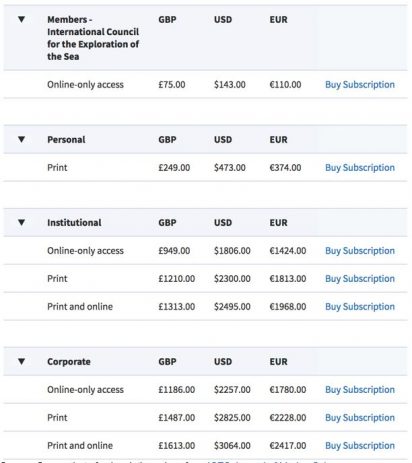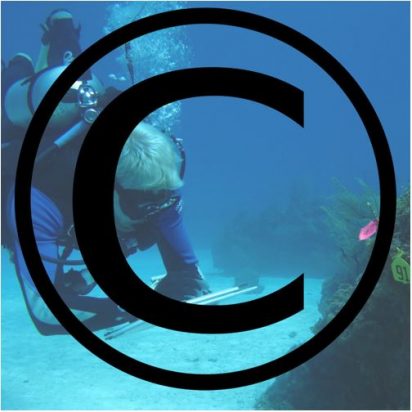It’s a big ocean so step up and share the knowledge
By Allison Brown and Nick Wehner

It is no secret that academic papers can be jargon-filled and boring. But they are still full of useful information about what works in marine management and in science. The lack of papers on what doesn’t work is a topic for another blog post. Unfortunately, academic papers are out of reach for most of the people who could use that information. This may be news to those who have always been in university library systems with access to electronic journals, but individual access to research articles can be expensive. Further, depending on the journal, you may only get access for one day. Take a recent paper published in the ICES Journal of Marine Science (the publisher of this journal is the Oxford University Press) titled “Effects of indiscriminate fisheries on a group of small data-poor species in Thailand.” This paper seems like it could be useful for fisheries managers in Thailand or nearby countries, right? Well, 24-hour access to this article costs a whopping 44 dollars. That’s just for one paper. For only 24 hours. The next option is to get a year-long subscription and the prices get even crazier. ICES Journal of Marine Science is just one of many marine science journals where a significant paywall inhibits access and is used here only as an illustration.

Now imagine you are a fisheries manager in Thailand. Could you afford access to research like this? The answer is no. The University of Washington’s proposed budget for e-journal subscriptions in 2018 is $12.7 million (information from personal communication). Individual subscriptions to just one journal can cost thousands of dollars even for non-profits with few employees. The average electronic journal subscription costs $1,396 a year and prices are rising by 5% a year, well in excess of inflation.
In the United States, The Nature Conservancy (TNC) only subscribes to three ocean-related journals (Mexico’s TNC doesn’t have any). The Washington Department of Natural Resources subscribes to zero journals. I was shocked when I found out that these organizations are forced to make decisions with needlessly-limited information. They do not have access to academic literature unless they use an employee who is affiliated with a university. Such sharing is in fact illegal, as the “academic sharing” exemption only applies to known students and colleagues for their personal use: work-related use is not permitted. This presents a legal quandary because both the sharer and the receiver of a single scientific journal article could be required to pay fines or jail time under both US and international copyright law.
Locking down science has an effect. One study found that primary science represented only 14% of the information cited in coral reef marine protected area management plans. With such an entrenched system is there any way out of the paywall void?
Publishing research in an Open Access journal is one option for authors, but that sometimes comes at a monetary cost to the author. Another option is an author sharing the final paper on a personal website, but that sharing is usually illegal unless the paper is Open Access. Another approach is to send it out to a listserv or a group of people. However that is also not allowed unless the paper is Open Access. Many authors put their final papers up on ResearchGate, an online community and research depository. Unfortunately, that is usually illegal, too. In fact, ResearchGate is in the middle of a massive lawsuit for illegally allowing millions of copyrighted papers to be hosted on its site. It is possible to ask the author for a copy. Anecdotally, OpenChannels, an information sharing community, estimates the response rate from authors to be 50% or less.

The only options left for authors are to negotiate with the publisher before signing a Copyright Transfer Agreement, to share a preprint (the pre-peer-review manuscript) in a non-profit repository, or to share a postprint (the peer-reviewed but not fully typeset PDF) of the research after the embargo period is up. Under no circumstances do publishers allow the final “version of record” PDF to be shared publicly, unless the author has paid to make the work Open Access or has successfully negotiated to keep hold of the copyright. Employers of research staff have the best ability to negotiate keeping copyright: Harvard University requires all work be publicly available, regardless if the publisher pay-walls their copy or not.
Copyright law is confusing, but don’t despair. There are lots of resources and information for ocean and marine-climate science on MarXiv’s site. MarXiv is a new repository that is not-for-profit and subject-matter-specific, meaning it can be used to legally share certain versions (the preprint or the postprint after the embargo period) of research. Once placed on MarXiv, a paper is freely available to everyone, forever.
Sharing the knowledge that you worked so hard to gain is only worth it if people can use it. Like the age old question of: If a tree falls in the forest and no one is around to hear it, does it make a sound? I ask you: If a research paper is published and no one can read it, what was the point of all that hard work?